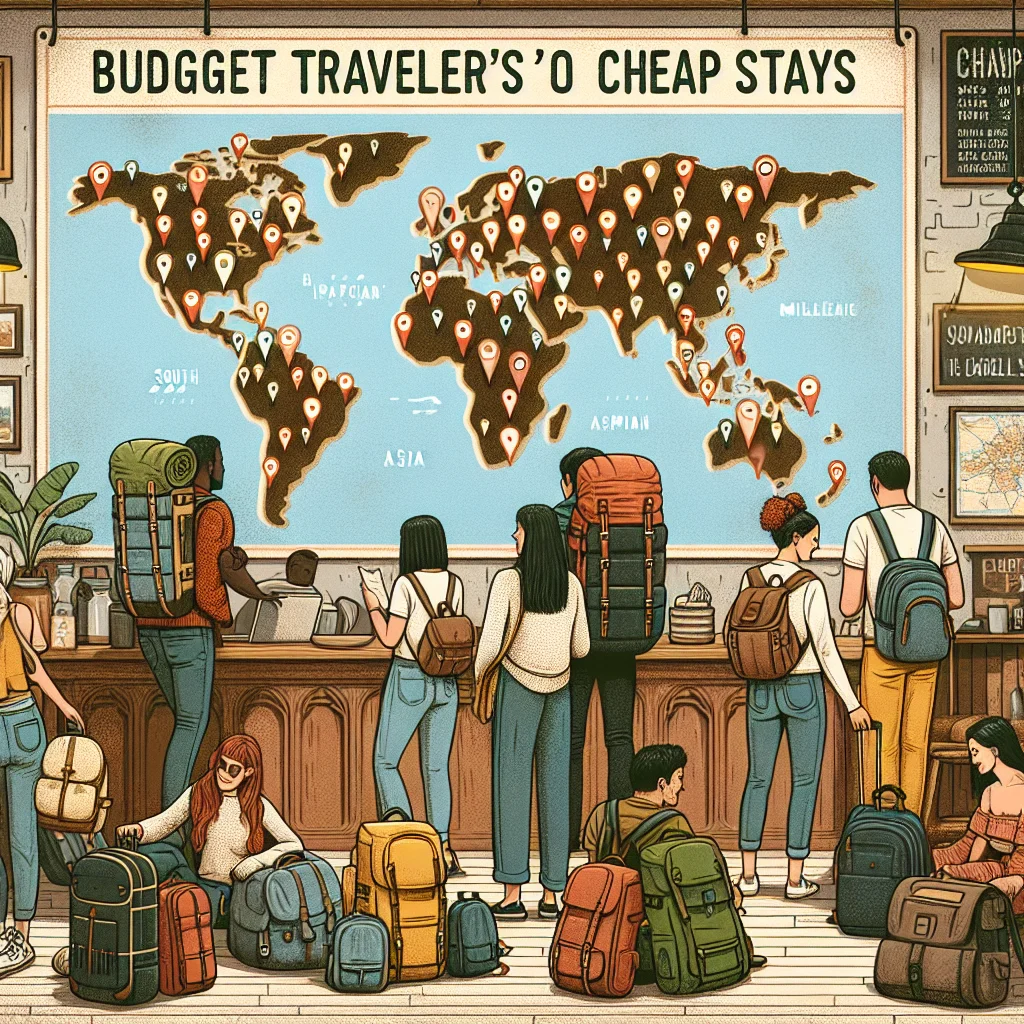Hostel Hopping: A Budget Traveler’s Guide To Cheap Stays
If you’re a budget traveler with a thirst for adventure, then “Hostel Hopping: A Budget Traveler’s Guide To Cheap Stays” is the ultimate resource you’ve been waiting for. Packed with insider tips and tricks, this guide is designed to help you navigate the world of hostels and make the most of your limited funds. Whether you’re backpacking through Europe or exploring exotic destinations, you’ll find everything you need to know about finding affordable accommodations that not only save you money but also offer a unique cultural experience. Get ready to embark on an unforgettable journey as you discover the hidden gems of budget travel through the lens of “Hostel Hopping.
Understanding Hostel Culture
What is a Hostel?
A hostel is a type of accommodation that offers budget-friendly options for travelers, especially those on a tight budget. Unlike hotels or bed and breakfasts, hostels provide shared rooms, also known as dormitories, where multiple guests can stay together. These dormitories usually consist of bunk beds and communal facilities such as bathrooms and common areas.
The origin and evolution of hostels
Hostels have a rich history dating back to the early 20th century. They were initially established as affordable lodging options for travelers, especially students and young backpackers. Over time, hostels have evolved to cater to the unique needs of budget travelers, offering a vibrant and communal atmosphere.
The concept of hostels originated in Germany, with the first official youth hostel opening in 1912. This hostel aimed to provide safe and affordable accommodations for young travelers. Since then, hostels have spread worldwide and become a popular choice for travelers of all ages seeking budget-friendly options with a social aspect.
Present trends in hostel culture
Hostel culture has evolved significantly in recent years, adapting to the changing needs and preferences of travelers. In addition to the traditional dormitory-style accommodations, hostels now offer a range of room options, including private rooms and female-only dorms.
Many hostels have embraced technology to enhance the guest experience. Features such as keyless entry systems, individual power outlets in dorms, and high-speed internet access have become common. Hostels are also increasingly focusing on creating unique spaces and fostering a sense of community among guests through organized activities, communal kitchens, and common areas.
Breaking Down Myths about Hostels
Common misconceptions about hostels
There are several misconceptions surrounding hostels that may deter some travelers from considering them as viable accommodation options. One common misconception is that hostels are dirty and poorly maintained. While the standards may vary from hostel to hostel, many hostels prioritize cleanliness and maintain a hygienic environment for their guests.
Another misconception is that hostels are only for young backpackers. While hostels do attract a younger crowd, they cater to travelers of all ages. It is not uncommon to find families, solo travelers, and even business travelers opting for a hostel stay.
Safety in hostels
Safety is a primary concern for any traveler, and hostels understand this. Most hostels have security measures in place, such as key card access, lockers for personal belongings, and CCTV cameras in common areas. It is still essential to exercise caution and follow basic safety practices, such as storing valuables securely and being aware of your surroundings.
Privacy in hostels
One concern travelers often have about staying in hostels is the lack of privacy. While it is true that dormitory-style accommodation means sharing a room with others, many hostels offer private rooms for those seeking more privacy. These rooms are generally more expensive than dorm beds but still provide a more budget-friendly option compared to hotels.
Understanding dorm room structures
Dorm rooms in hostels come in various sizes, accommodating different numbers of guests. Depending on the hostel, you may find dorms with four beds, six beds, or larger dorms with twenty or more beds. Some hostels also offer female-only dorms, which provide an added sense of security and comfort for female travelers.
Hostel Facilities and Features
Basic amenities you can expect
Hostels provide basic amenities to ensure a comfortable stay for their guests. These amenities typically include clean beds with bedding, shared bathrooms with hot showers, and communal kitchen facilities. Most hostels also offer free Wi-Fi access, allowing guests to stay connected during their travels.
Additional facilities
Apart from the basic amenities, many hostels go the extra mile to provide additional facilities to enhance the guest experience. These may include common areas for socializing, laundry facilities, luggage storage options, and even rooftop terraces or swimming pools. Some hostels also offer breakfast options, either included in the room rate or available at an additional cost.
Variations in dorms and private rooms
Hostels offer a range of room options to suit different preferences and budgets. Dormitory-style rooms are the most common, with bunk beds and shared facilities. Private rooms, ranging from single to triple or even larger, are also available in many hostels. These private rooms provide more privacy and typically come with en-suite bathrooms.
Unique hostel features
Hostels often have unique features that set them apart from traditional accommodations. Some hostels may have an on-site bar or restaurant, offering a convenient place for guests to socialize and enjoy a meal. Others may organize social events, such as pub crawls or city tours, to help guests connect with fellow travelers and experience the local culture.
Financial Aspect of Hostel Living
Average cost of hostels
One of the primary reasons why travelers choose hostels is their affordability. The cost of staying in a hostel varies depending on the location, season, and type of room chosen. On average, hostel prices range from $10 to $40 per night per person. Staying in a dormitory-style room is generally cheaper than opting for a private room.
Additional costs – deposits, locker fees
Some hostels may require a small deposit upon check-in for security purposes. This deposit is usually refundable upon check-out if there are no damages to the property. Lockers are also available in many hostels to store personal belongings securely. Some hostels may charge a small fee for using these lockers.
Saving money with long-term stays and deals
If you’re planning an extended trip, staying in a hostel can save you a considerable amount of money. Many hostels offer discounted rates for guests staying for a longer duration, such as weekly or monthly rates. It’s also worth checking for any deals or promotions that hostels may offer, especially during non-peak travel seasons.
Comparing costs with hotels and BnBs
When it comes to cost, hostels are undoubtedly more budget-friendly compared to hotels and bed and breakfasts. Hotels typically come with higher price tags, especially for private rooms. Bed and breakfasts generally offer a more personalized experience but can be more expensive. Hostels strike a balance between affordability and social interaction, making them ideal for budget-conscious travelers.
Choosing the Right Hostel
Factors to consider
When choosing a hostel, several factors should be taken into consideration. The first is the location. Consider the proximity of the hostel to attractions, public transportation, and other amenities.
Another factor to consider is the atmosphere and vibe of the hostel. Some hostels are known for their lively and social atmosphere, while others may cater to a quieter crowd. Think about what kind of experience you are seeking and choose a hostel that aligns with your preferences.
Researching ratings and reviews
Before booking a hostel, it is wise to read through ratings and reviews from previous guests. Websites such as Hostelworld, Booking.com, and TripAdvisor provide valuable insights into the quality and reputation of hostels. Pay attention to factors such as cleanliness, staff friendliness, and the overall atmosphere as reported by other travelers.
Considering location
The location of a hostel can significantly impact your overall travel experience. Consider whether you prefer a hostel in the city center for easy access to attractions or a quieter location for a peaceful stay. Take into account safety and the availability of public transportation when choosing a hostel’s location.
Shortlisting based on amenities and facilities
Make a list of essential amenities and facilities you desire in a hostel. Do you require a kitchen to cook your meals? Would you like free Wi-Fi access? Are common areas important to you? Shortlist hostels based on your priorities and preferences, ensuring they offer the facilities you need for a comfortable stay.
Booking Hostels
Online booking platforms
There are several online booking platforms dedicated to hostels, making it easy to compare prices, read reviews, and book a hostel of your choice. Websites such as Hostelworld, Booking.com, and Hostels.com are popular options that provide a comprehensive selection of hostels worldwide.
Booking directly with the hostel
In some cases, it may be beneficial to book directly with the hostel. By doing so, you can communicate directly with the staff, inquire about specific needs or preferences, and potentially secure a better deal. Some hostels offer discounts for direct bookings or have unique room options not available through third-party booking platforms.
Timing your booking for the best rates
Timing your hostel booking can play a significant role in obtaining the best rates. Booking in advance, especially during peak travel seasons, can help secure availability and potentially save you money. However, if you have a flexible travel schedule, last-minute bookings can sometimes yield discounted rates as hostels try to fill any remaining vacancies.
Cancellation policies and refunds
Before booking a hostel, carefully read and understand the cancellation policies. Hostels may have different cancellation deadlines and refund policies. Some may offer free cancellations up to a certain date, while others may require a non-refundable deposit. Make sure you are aware of the terms and conditions to avoid any unexpected fees.
Interacting with Fellow Travelers
Social life in hostels
One of the biggest draws of staying in a hostel is the social aspect. Hostels provide a unique opportunity to meet fellow travelers from different parts of the world. Common areas such as lounges, kitchens, and outdoor spaces are perfect gathering spots where you can strike up conversations and form new friendships.
Networking and making friends
Hostels act as hubs for like-minded travelers, enabling you to network and make friends from around the globe. Engage in conversations, share travel tips and stories, and join group activities or outings organized by the hostel. Be open to new experiences and embrace the diversity of cultures and backgrounds you will encounter.
Participating in hostel events and activities
Many hostels organize events and activities to foster a sense of community among guests. These may include city tours, pub crawls, cooking classes, or game nights. Participating in these activities not only enhances your travel experience but also gives you an opportunity to connect with other travelers and create lasting memories.
Dealing with uncomfortable situations
While the majority of interactions in hostels are positive and enjoyable, it is essential to be prepared for the occasional uncomfortable situation. Respectful communication, setting personal boundaries, and addressing any concerns with the hostel staff can help resolve conflicts. Remember that hostels attract a diverse range of people, and conflicts can arise, but they can often be managed effectively with open conversation.
Essentials for Hostel Living
Packing essentials
When staying in a hostel, certain essentials can make your experience more comfortable. Bring earplugs or headphones to drown out noise, a sleeping mask to block out light, and a travel towel as some hostels may not provide towels. Additionally, a padlock to secure your belongings in lockers is essential.
Following hostel rules
Respect the rules and guidelines set by the hostel to ensure a harmonious stay for all guests. These rules may include quiet hours, designated smoking areas, or kitchen etiquette. Familiarize yourself with the specific rules of each hostel and abide by them to create a positive environment for everyone.
Respecting fellow travelers
Hostels are shared spaces where people from different backgrounds and cultures come together. It is important to be respectful and considerate of fellow travelers. Keep noise levels to a minimum during quiet hours, clean up after yourself, and be mindful of personal space and belongings.
Managing your belongings
In dormitory-style rooms, it is crucial to keep your belongings organized and secure. Utilize the lockers provided by the hostel to store your valuables and ensure that you have a lock to secure them. Additionally, label your belongings to avoid any confusion or accidental mix-ups.
Finding Work in Hostels
Work exchange programs
Many hostels offer work exchange programs, allowing travelers to work in exchange for accommodation or reduced rates. These programs can be an excellent opportunity to immerse yourself in the hostel culture, meet new people, and save money on lodging expenses. Tasks may include reception work, cleaning, or organizing hostel events.
Teaching English
For travelers with English language skills, teaching English can be a viable option to work in hostels abroad. Some hostels offer English language classes to their staff or local community members, providing an opportunity for travelers to contribute and earn an income. Teaching English in a hostel environment can be a rewarding experience that combines work and travel.
Working as a hostel volunteer
Hostels often rely on volunteers to help with various tasks. This can be an excellent way to gain valuable experience, develop new skills, and contribute to the hostel community. Duties may range from reception work to organizing events or assisting with maintenance. Volunteer positions may be short-term or long-term, depending on the needs of the hostel.
Benefits of working in a hostel
Working in a hostel offers several benefits beyond monetary compensation. It allows you to immerse yourself in the local culture, interact with fellow travelers, and develop valuable skills such as communication, problem-solving, and teamwork. Working in a hostel can also provide a unique perspective on the travel industry and a platform to share your experiences with others.
Destination-specific Hostel Recommendations
Best hostels in Europe
Europe is a popular destination for budget travelers, and there are countless fantastic hostels to choose from. Some highly recommended hostels include Generator Hostel in Barcelona, The MadHouse in Prague, and Flying Pig Downtown in Amsterdam. These hostels offer great locations, vibrant atmospheres, and excellent facilities.
Top-rated hostels in Asia
Asia is home to an array of budget-friendly hostels that provide unique cultural experiences. Suneta Hostel Khaosan in Bangkok, Vietnam Backpacker Hostels in Vietnam, and K’s House Kyoto in Japan are among the highly rated hostels in Asia. These hostels offer a blend of comfort, affordability, and opportunities to connect with fellow travelers.
Recommended hostels in South America
South America is a continent known for its warm hospitality and diverse landscapes. For travelers exploring South America on a budget, Loki Hostel in Cusco, Selina La Paz in Bolivia, and El Diablo Tranquilo in Uruguay are popular choices. These hostels offer a friendly atmosphere, convenient locations, and a range of amenities.
Hostel experiences in Australia
Australia is a destination that attracts travelers from all over the world. Base Backpackers in Sydney, Nomads Melbourne, and Bungalow Bay Koala Village in Magnetic Island are highly recommended hostels in Australia. These hostels provide a unique Australian experience, with friendly staff, organized activities, and comfortable accommodations.
Finding hostels in North America
Hostels in North America may be less common compared to other regions, but they provide budget-friendly options for travelers. HI New York City, Green Tortoise Hostel in Seattle, and The Independente Hostel & Suites in Lisbon are reputable hostels in North America. These hostels offer convenient locations, comfortable stays, and opportunities to connect with fellow travelers.
In conclusion, understanding hostel culture is essential for budget travelers looking for affordable and socially enriching accommodation options. Hostels provide an array of facilities and features, cater to a diverse range of travelers, and offer unique experiences in different destinations. By dispelling common myths, choosing the right hostel, and embracing the social aspect, you can make the most out of your hostel experience and create lasting memories.







